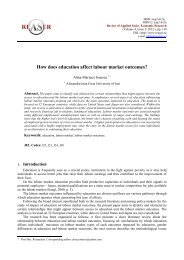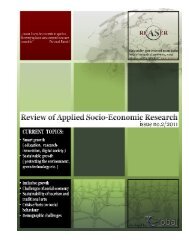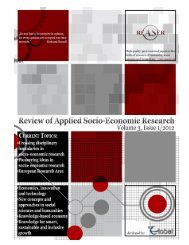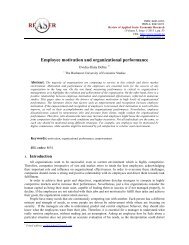new characteristics of inequalities in the information society and ...
new characteristics of inequalities in the information society and ...
new characteristics of inequalities in the information society and ...
You also want an ePaper? Increase the reach of your titles
YUMPU automatically turns print PDFs into web optimized ePapers that Google loves.
ISSN: 2247-6172;<br />
ISSN-L: 2247-6172<br />
Review <strong>of</strong> Applied Socio- Economic Research<br />
(Volume 5, Issue 1/ 2013 ), pp. 173<br />
URL: http://www.reaser.eu<br />
e-mail: editors@reaser.eu<br />
The New Economics Foundation (Marks et al., 2006) created <strong>the</strong> Happy Planet Index (HPI) to answer<br />
such questions as, “does happ<strong>in</strong>ess have to cost <strong>the</strong> earth?” In o<strong>the</strong>r words, can we live long <strong>and</strong> happy<br />
lives with<strong>in</strong> <strong>the</strong> resource capacity <strong>of</strong> <strong>the</strong> planet? The first HPI <strong>in</strong>corporated national life satisfaction <strong>and</strong><br />
life expectancy scores along with <strong>the</strong> Ecological Footpr<strong>in</strong>t <strong>of</strong> nations. Countries with high life satisfaction<br />
<strong>and</strong> life expectancy while ma<strong>in</strong>ta<strong>in</strong><strong>in</strong>g a low Ecological Footpr<strong>in</strong>t were ranked at <strong>the</strong> top. The second HPI<br />
(Abdallah et al., 2009) determ<strong>in</strong>ed that Costa Rica had <strong>the</strong> highest number <strong>of</strong> happy life years, nearly<br />
achiev<strong>in</strong>g a footpr<strong>in</strong>t referred to as “one-planet liv<strong>in</strong>g,” that is, us<strong>in</strong>g <strong>the</strong> country’s fair share <strong>of</strong> <strong>the</strong><br />
earth’s resources as opposed to consum<strong>in</strong>g resources as if <strong>the</strong>re is access to more than one planet. By <strong>the</strong><br />
third HPI, Costa Rica rema<strong>in</strong>ed at <strong>the</strong> top <strong>of</strong> <strong>the</strong> charts, while <strong>the</strong> USA’s high Ecological Footpr<strong>in</strong>t brought<br />
it to 105 out <strong>of</strong> 151 countries. Importantly, <strong>the</strong> HPI illum<strong>in</strong>ated that if every country had a similar<br />
Ecological Footpr<strong>in</strong>t to <strong>the</strong> USA, it would require four planets to meet this level <strong>of</strong> consumption. Romania<br />
achieves a Happy Planet Index Score <strong>of</strong> 42.2 <strong>and</strong> ranks #75 <strong>of</strong> all <strong>the</strong> countries analyzed. Romania's HPI<br />
score reflects a relatively high life expectancy, relatively low levels <strong>of</strong> experienced well-be<strong>in</strong>g, <strong>and</strong> a<br />
moderately high ecological footpr<strong>in</strong>t.<br />
In ano<strong>the</strong>r report made by UNICEF, Romania occupies <strong>the</strong> last place <strong>in</strong> a rank<strong>in</strong>g <strong>of</strong> child well-be<strong>in</strong>g<br />
<strong>in</strong> developed countries. For this study several social issues have been considered, <strong>in</strong>clud<strong>in</strong>g material<br />
comfort, health <strong>and</strong> safety <strong>of</strong> children. The report exam<strong>in</strong>es changes <strong>in</strong> <strong>the</strong> condition <strong>of</strong> children <strong>in</strong> <strong>the</strong><br />
decade 2000-2010 <strong>in</strong> a total <strong>of</strong> 29 states, based on <strong>the</strong> average marks obta<strong>in</strong>ed <strong>in</strong> five dimensions <strong>of</strong> child<br />
well-be<strong>in</strong>g, tak<strong>in</strong>g <strong>in</strong>to account 26 <strong>in</strong>ternationally comparable <strong>in</strong>dicators. The Ne<strong>the</strong>rl<strong>and</strong>s ranks first <strong>in</strong> this<br />
rank<strong>in</strong>g, <strong>the</strong> only country that ranks <strong>in</strong> <strong>the</strong> top five <strong>in</strong> all dimensions considered: material well-be<strong>in</strong>g, health<br />
<strong>and</strong> safety, education, behavior <strong>and</strong> risks, hous<strong>in</strong>g <strong>and</strong> <strong>the</strong> environment. However, UNICEF report shows<br />
that <strong>the</strong>re is a direct l<strong>in</strong>k between <strong>the</strong> well-be<strong>in</strong>g <strong>of</strong> children <strong>and</strong> GDP per capita. The Czech Republic has<br />
achieved a better result than Austria, Slovenia is better ranked than Canada <strong>and</strong> Portugal has a better result<br />
than that <strong>of</strong> <strong>the</strong> United States <strong>of</strong> America. After <strong>the</strong> Ne<strong>the</strong>rl<strong>and</strong>s, four Nordic countries (F<strong>in</strong>l<strong>and</strong>, Icel<strong>and</strong>,<br />
Norway <strong>and</strong> Sweden) occupy <strong>the</strong> top spots <strong>in</strong> <strong>the</strong> rank<strong>in</strong>gs well-be<strong>in</strong>g <strong>of</strong> children, while <strong>the</strong> last four places<br />
are occupied by three <strong>of</strong> <strong>the</strong> poorest countries considered <strong>in</strong> this top - Latvia, Lithuania <strong>and</strong> Romania, <strong>and</strong><br />
one <strong>of</strong> <strong>the</strong> richest, USA.<br />
The same report also shows how children perceive life satisfaction <strong>in</strong> <strong>the</strong> countries studied. Over 85%<br />
<strong>of</strong> children <strong>in</strong> <strong>the</strong> developed nations have a high level <strong>of</strong> overall life satisfaction; even <strong>in</strong> <strong>the</strong> countries at <strong>the</strong><br />
bottom <strong>of</strong> <strong>the</strong> league, more than 75% <strong>of</strong> children placed <strong>the</strong>mselves above <strong>the</strong> mid-po<strong>in</strong>t <strong>of</strong> <strong>the</strong> life<br />
satisfaction ladder. The Ne<strong>the</strong>rl<strong>and</strong>s heads <strong>the</strong> league table <strong>of</strong> children’s subjective well-be<strong>in</strong>g with 95%<br />
<strong>of</strong> its children report<strong>in</strong>g a high level <strong>of</strong> life satisfaction. In <strong>the</strong> top five countries – F<strong>in</strong>l<strong>and</strong>, Greece, Icel<strong>and</strong>,<br />
<strong>the</strong> Ne<strong>the</strong>rl<strong>and</strong>s <strong>and</strong> Spa<strong>in</strong> – approximately 90% <strong>of</strong> children reported a high level <strong>of</strong> life satisfaction <strong>in</strong><br />
2009/2010. Only <strong>in</strong> Pol<strong>and</strong> <strong>and</strong> Romania does <strong>the</strong> ‘high life satisfaction’ rate fall below 80%. From <strong>the</strong><br />
earliest years, <strong>the</strong> child’s sense <strong>of</strong> subjective well-be<strong>in</strong>g is <strong>in</strong>timately bound up with relationships, <strong>and</strong><br />
particularly with parents <strong>and</strong> peers.<br />
2.1. Subjective well-be<strong>in</strong>g: conceptual delimitation<br />
Happ<strong>in</strong>ess was present <strong>in</strong> philosophical debates s<strong>in</strong>ce <strong>the</strong> Greek classicism period. Of great <strong>in</strong>fluence<br />
was <strong>the</strong> dispute between <strong>the</strong> two concepts: Hedone <strong>and</strong> eudaimonia (Ryan <strong>and</strong> So, 2001). The first concept<br />
related happ<strong>in</strong>ess as pleasure - not only <strong>the</strong> senses, but also from Epicurus, m<strong>in</strong>d (hedonistic moral <strong>the</strong>ory).<br />
In <strong>the</strong> Nicomachean Ethics, Aristotle criticizes this view, claim<strong>in</strong>g <strong>in</strong>stead eudaimonia, that is liv<strong>in</strong>g <strong>in</strong><br />
agreement with <strong>the</strong> "true self" (daimon), open<strong>in</strong>g path <strong>of</strong> ethical philosophies that happ<strong>in</strong>ess consists <strong>in</strong> <strong>the</strong><br />
realization <strong>of</strong> human potential (Waterman, 1993). In psychology, <strong>the</strong>se two orientations meet a strong<br />
revival <strong>in</strong> recent years, with recent branches <strong>of</strong> hedonic psychology, which <strong>in</strong>cludes <strong>the</strong> study <strong>of</strong> pleasant<br />
<strong>and</strong> unpleasant experiences, <strong>and</strong> general levels <strong>of</strong> existence different from states <strong>of</strong> consciousness<br />
(Kahneman et al. 1999), <strong>and</strong> <strong>of</strong> positive psychology, "<strong>the</strong> science <strong>of</strong> positive subjective experience, traits








